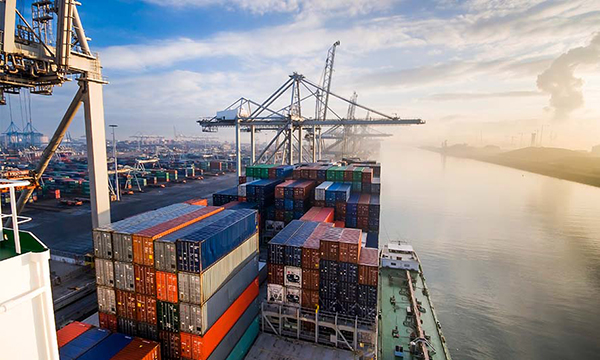The changing world order is prompting companies to rethink their risk exposure in an interconnected global economy.
By Shailesh Kumar, Head of The Hartford’s Global Specialty Insights Center

Growth in the first half of 2023 averaged approximately 2.0%, driven mainly by private sector investments outside of the residential housing sector, government spending, and strong consumer demand. In 2024, The Hartford’s Global Specialty Insights Center is expecting investments and government spending to continue and may support growth in the year. However, consumer health may start to weaken due to elevated leverage, higher interest rates, and sticky inflation.

Residential construction activity will likely continue to experience challenges in 2024. Despite relatively high mortgage rates, demand for new construction persisted through the second half of 2023. This will likely carry forward into 2024. However, inventory could remain an issue, as evidenced by weak building permits and new starts data in 2023.
In the nonresidential space, The Hartford’s Global Specialty Insights Center anticipates that there will be robust demand for the construction of manufacturing centers, which has been affected by geopolitics and an interest to shift high-tech manufacturing back to the US and partner nations. Demand in infrastructure will also rise due to various fiscal stimulus programs.
Per the International Monetary Fund (IMF), China’s economic growth is already forecasted to decline to 4.5% from above 6.0% in 2023 and more than 10% a decade ago. The Hartford’s Global Specialty Insights Center believes a slowing Chinese economy could create implications for Europe given the region’s trade surplus with China.
US import growth may also fall in 2024 due to weaker consumer demand. Before the pandemic, China accounted for approximately 24% of imports into the US, which fell to 14% in 2023. Politics affecting trade and investment may cause this shift to continue and could further new opportunities for manufacturing high-end goods in the US. New markets such as Mexico, India and Vietnam could also grow their manufacturing potential due to these shifts.
The changing world order is prompting companies to rethink their risk exposure in an interconnected global economy. Companies should be proactive at taking steps to prepare for potential risks and understand how best to mitigate the disruption to their operations.
It is important to understand current production flows by mapping the supply chain and analyzing the impact on the balance sheet of every location you operate. A deep understanding of critical flows and choke points enables companies to assess their suppliers, identify backup sources and create contingency plans in the event they lose a critical supplier.
It is essential to pay attention to a country’s regulatory environment, labor costs and supporting infrastructure. The regulatory environment is critical to understanding the financial and regulatory issues of the country you’re operating in, including the insurance laws.
Another consideration is the availability and cost of labor. Europe, for example, has an aging population and high labor costs. On the other hand, India, the world’s most populous country, has low labor costs. While population and costs must be factored in, working conditions are also important. To avoid an inadvertent controversy, evaluate whether there are known or suspected cases of human rights violations in that region or country.
To successfully operate in multiple countries, businesses need to stay on top of geopolitical developments that could disrupt their operations, such as potential riots, labor strikes, military conflicts, or economic issues. Staying informed can help businesses create contingency plans before a country reaches crisis.

The pandemic-era shutdowns focused attention on the need for supply chain resilience. Since then, demand imbalances have eased, and shipping costs have dropped to pre-pandemic levels. That creates new opportunities for companies as they look to mitigate risk and increase resilience.
Around the globe, businesses are methodically shifting their operations in ways that will reshape commerce for decades to come. In addition to supply considerations, such as labor costs and infrastructure, businesses can align their production with new market opportunities. India, for example, is not just the most populous country, it is also the fastest-growing economy with a rising middle class and a booming manufacturing industry.
There have also been emerging opportunities to onshore production, renew domestic manufacturing, and locate plants closer to end customers. New plants for chips, batteries and electric vehicles are opening at a rapid pace across the southern and midwestern U.S. Additionally, the 30-year-old North American Free Trade Agreement (NAFTA) is reemerging as U.S. companies shift manufacturing to Mexico and Canada, amid a broader “friend-shoring” trend.
As countries compete for influence on the global stage over the coming decades, companies will be more exposed to risks and threats to their business operations. However, with strategic planning and vigilance, businesses can spot new opportunities and mitigate potential fallout amid the rapidly evolving world order.

Shailesh Kumar leads The Harford’s Global Specialty Insights Center. He is an economist with deep expertise in economic, credit and geopolitical matters. He was formerly with the U.S. Department of the Treasury.
Scott Ellyson, CEO of East West Manufacturing, brings decades of global manufacturing and supply chain leadership to the conversation. In this episode, he shares practical insights on scaling operations, navigating complexity, and building resilient manufacturing networks in an increasingly connected world.